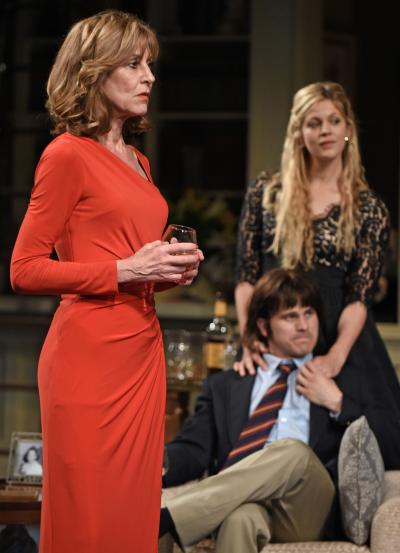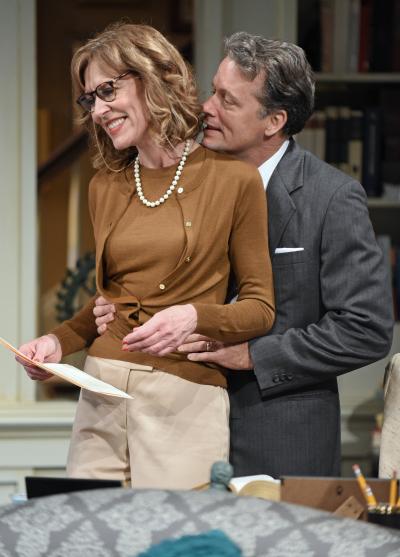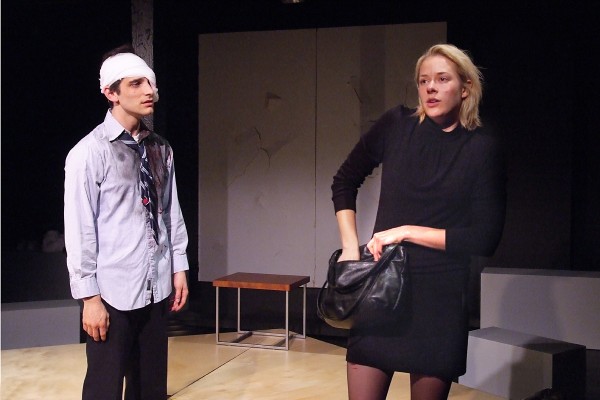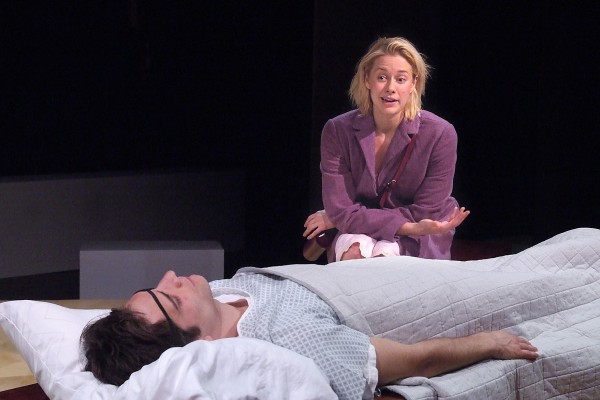Anthony Giardina’s The City of Conversation is certainly a well-named play since it is located in Washington, DC (well, Georgetown), where the talk is mostly political, mostly civil (by 1979 standards), the conflicts mostly familial, and where the two are inextricably linked.
Now on view at The Wallis in Beverly Hills, The City of Conversation can be described as a well-made play, which is part of its problem. It is traditional in the old-fashioned sense. It has a beginning a middle and an end, never veering far from this geometry or from the comfortable upscale living room (the designer is Jeff Cowie), where eyebrows are frequently raised and approval or disapproval go down better with a dose of politeness and a shot of cognac. In tone and formality, this Conversation is reminiscent of Gore Vidal’s The Best Man, which is to say it is about political discourse, in this case with family collisions tossed in.
Hester Ferris (the willowy Christine Lahti) is a grande dame of the old school, the impressive behind-the-scenes power broker who reigns over small dinner parties at which large landmark decisions often get influenced, if not made. She is getting ready for one such evening event when her son Colin (Jason Ritter) and his fiancée Anna Fitzgerald (Georgia King) show up at her door a day earlier than expected. Both are returning, grimy and tired, from distinguished stints at The London School of Economics.
If this prepares you for some political conflicts between parent and child, you’re right. What is less predictable is that it’s the parent who’s the dedicated liberal and the son and his lady who are budding conservatives. The dinner event, at which Hester plans to influence policy with practiced charm, takes place as planned, attended by the targeted senator from Kentucky, George Mallonee (an ebullient David Selby), and his wife, Carolyn (the beloved Michael Learned). Also present, aside from Colin and Anna, are Hester’s widowed sister, Jean (Deborah Offner), who lives with Hester and serves as her overworked assistant, and Chandler Harris (Steven Culp), an undivorced senator from Virginia who is Hester’s live-in lover.
The verbal political and emotional stand-offs in that living room demand that you listen hard, because the repartee is at once pointed, brittle, smart and sometimes too sophisticated for it own good. It is soon apparent that Anna is going to cause trouble and that family battle lines will be drawn. The discourse is clever, yes, but in an inauthentic and uninvolving sort of way, perhaps because the characters in this play too often feel like mouthpieces for ideas. The dialogue is cocktail party prattle even when there is no party. What is remarkable is how little we care about these people, how disingenuous their feelings can be and how deeply they are buried, when they are there at all.
This problem may be causing the underlying detachment in the performances. It’s as if the actors, taking their cue from the parry-and-thrust of the dialogue, cannot rise above — or dig below — what is being said to discover what is being felt. The declaration of war between Hester and her eventual daughter in law Anna, stubbornly remains a bloodless battle as performed, evoking insufficient emotion.
Director Michael Wilson, too, may have found the shallowness of the characters difficult to overcome. Wilson has many fine credits to his name, including his gorgeous direction of The Trip to Bountiful with Cicely Tyson seen at The Ahmanson not long ago, and the Broadway revival of The Best Man. (He returns to the Ahmanson with Grey Gardens this coming summer.) Whatever the reason, there is a flaccid quality to these interrelationships, when in fact, there should be at least a few strong sparks. Too much calculated talk designed to cover-up real meaning can become habit-forming. It also can permanently disguise any genuine emotion.
Is this the best recipe for a play? Not really. We require a level of sincerity. This play offers us a simulacrum.
On the other hand, the advent of Paul Crewes as the new artistic director of the Wallis is full of almost over-the-top promise. Aside from a packed roster of scheduled Talk, Dance, Jazz and Music, the intriguing theatre events announced for next season include Stephen Sondheim’s rarely seen Merrily We Roll Along, a new collaboration with Deaf West Theatre titled Edward Albee’s At Home at the Zoo, Peter Brook’s Battlefield, Complicité/Simon McBurney’s
The Encounter, Kneehigh’s 946, RSC/Filter Theatre’s Twelfth Night,
Hershey Felder’s newest work titled Tchaikovsky, and Alexi Kaye Campbell’s The Pride. Crewes will be a busy man.
Top image: l-r: Steven Culp, Georgia King, Jason Ritter (seated) and David Selby in The City of Conversation at The Wallis.
Photos by Kevin Parry.
WHAT: The City of Conversation
WHERE: Wallis Annenberg Center for the Performing Arts, Bram Goldsmith Theater, 9390 Santa Monica Blvd, Beverly Hills, CA, 90210
WHEN: Tuesday-Fridays, 8pm; Saturdays 3 & 8pm; Sundays, 2 & 7pm. Ends June 4, 2016.
HOW: Single tickets: $29-$110 (subject to change), available at www.TheWallis.org or 310.746.4000 or in person at the Wallis box office, 9390 Santa Monica Blvd, Beverly Hills, CA, 90210.
GRUESOME PLAYGROUND INJURIES AT THE HUDSON BACKSTAGE
Rajiv Joseph’s Gruesome Playground Injuries does provide blood and some guts, but it is more of an audition piece or classroom exercise than a full play. Consisting of a series of encounters that take place over three decades between two people who knew each other as children and grew apart — and not apart — as they grew up, it tracks their co-dependency as they reach out to one another to survive.
True, Kayleen (Sara Rae Foster) and Doug (Jeff Ward) are not the most stable of individuals. They hint at family problems. Both have issues with nausea, while he likes to take physical risks that result in grave bodily injuries and she likes to cut herself.
The way this two-hander is structured, with unduly long scene breaks and costume changes (insisted on by the author and adhered to by director John Hindman), makes for a needlessly tedious one-note performance you might call flat-line theatre.
Remembering Ward’s performance in the The Theatre @Boston Court’s Stupid F***g Bird we know the actors can do better. Responsibility rests with Hindman’s staging which does little to counteract the flat-lining. The production is a minimalist one-note exercise played on a barebones set with invariably sluggish pacing. It is difficult to think that this was written by the same person who gave us the terrific Guards at the Taj (seen last year at The Geffen), which also was a two-hander, more gruesome than this one, but that really knew how to soar.
WHAT: Gruesome Playground Injuries
WHERE: Hudson Backstage, 6539 Santa Monica Blvd., Los Angeles, CA 90038.
WHEN: Fridays, 8pm; Saturdays, 8pm; Sundays 3pm. Ends June 26.
HOW: Tickets $25 are available at www.plays411.com/playground or 323.960.7773.
Photos by Ed Krieger.
Sylvie Drake is a trilingual translator and writer, who was born in Alexandria, Egypt. She has an MFA in directing from the Pasadena Playhouse, is a former theatre critic and columnist for the Los Angeles Times, serving as chief critic for the last three of a total of 23 years. She was invited to establish Prima Facie, the first new play festival for the Denver Center Theatre Company that continues to this day under a different name, and later served for several years as director of Media Relations & Publications for The Denver Center for the Performing Arts as well as advisor to the Denver Center Theatre Company. She was twice president of the Los Angeles Drama Critics Circle, is a current member of the American Theatre Critics Association and a current contributor to mindev.culturaldaily.com and other publications.
